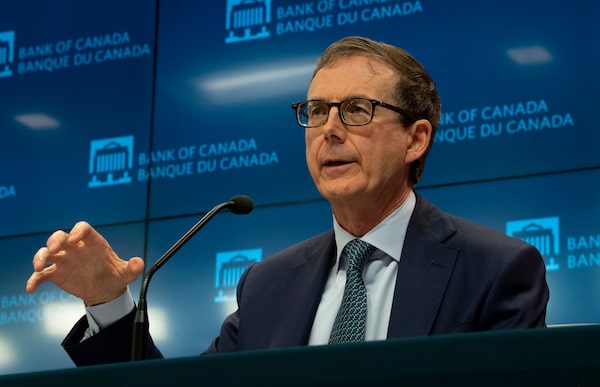
Bank of Canada Governor Tiff Macklem responds to a question during a news conference on July 15, 2020 in Ottawa.Adrian Wyld/The Canadian Press
New Bank of Canada Governor Tiff Macklem took to the international stage Thursday to call for central banks to better engage average citizens, saying that the pandemic has heightened the importance of communicating directly with an often skeptical and misinformed public.
Speaking at the Jackson Hole Symposium – one of the world’s most important annual summits of economic leaders and experts, being held this year by video conference because of the COVID-19 pandemic – Mr. Macklem said that central banks need to shift their communications focus from “transparency with markets” to “engagement with the public.” He said that with everyday citizens showing greater interest in monetary policy amid the strong actions central banks have taken during the pandemic, banks need to both communicate with them more clearly and listen more to their perspectives on the economy.
“This heightened interest is an opportunity, and it is critical that we do not squander it,” Mr. Macklem said. “Let’s make this another legacy [of the crisis] – a deeper relationship between the central bank and its citizens.”
Mr. Macklem delivered his message the same week that the Bank of Canada launched public consultations as part of a major review of its framework for setting monetary policy, which it will conclude some time next year. For the first time, the central bank is conducting an online survey for everyday Canadians to contribute their views on how the bank manages inflation and interest-rate decisions.
The speech also came just hours after Jerome Powell, chair of the U.S. Federal Reserve, gave his own Jackson Hole address unveiling the outcome of a similar policy review by the Fed – highlighted by a decision by the U.S. central bank to adopt a more flexible approach to its 2-per-cent inflation target. The Fed’s review process also featured increased discussions with the general public.
Mr. Macklem, who took the helm at the Bank of Canada in June, lamented that public trust in institutions and economic experts has eroded in recent years, particularly in the aftermath of the 2008-09 financial crisis. The COVID crisis has further complicated public perceptions, as massive, co-ordinated measures by central banks and governments have raised new doubts about the independence of central banks from political interference.
He added that in the social-media era, people are getting a lot of mixed and inaccurate messages from a wider range of sources than ever before.
“The forces that are pushing misinformation on the public are preying on this crisis. A segment of the population still mistrusts public authorities and experts,” he said.
“The imperative is to step boldly beyond market transparency and engage with the public to explain how our actions serve our economy-wide objectives,” he said. “This means listening to more people, understanding their perceptions – accurate or not – factoring broader public views into our policy decisions and communicating with people on their terms, not ours.”
While central banks have largely relied on communicating to the public through the media, Mr. Macklem said that recent research indicates that this is no longer the most effective way to get a clear message to citizens.
“The best way to get our messages to the public is to deliver them ourselves.”
While the Bank of Canada has considerably increased its communications and openness in recent years, critics say it still has a long way to go.
“There is excellent work being done at the Bank of Canada. Communications, however, have considerable room for improvement in terms of matters like consistency, clarity, more openness, less aloofness and more consideration of alternative views,” Bank of Nova Scotia economist Derek Holt said in a research note. “Just a few weeks into the job, Macklem’s move is encouraging in this regard.”
The Bank of Canada’s public consultations are tied to preparations for next year’s renewal of its five-year agreement with the federal government on its policy framework. The current agreement uses an inflation target of 2 per cent to guide interest-rate decisions, which hasn’t changed in nearly 25 years. But the bank has said that it is examining several alternatives to its current inflation-targeting approach.
Other major central banks, including the European Central Bank and the Bank of England, are also in the midst of similar reviews.
Mr. Powell revealed Thursday that the Fed Reserve will begin targeting “average” inflation at 2 per cent – signifying that it is now willing to allow inflation to exceed the target for some time to counter an extended period of below-target inflation. An average inflation target is one of the options the Bank of Canada is considering.
Your time is valuable. Have the Top Business Headlines newsletter conveniently delivered to your inbox in the morning or evening. Sign up today.
 David Parkinson
David Parkinson